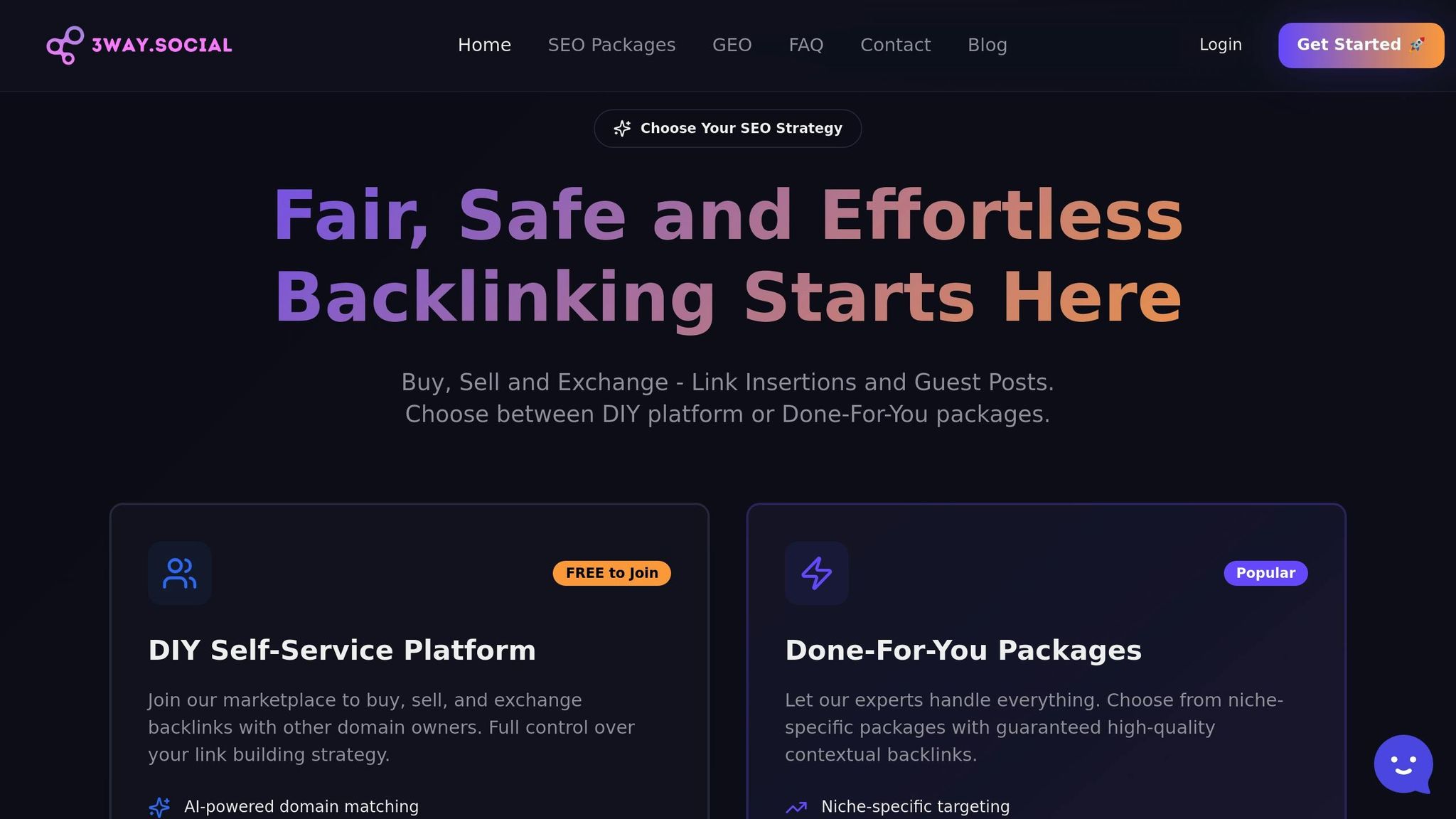Last Updated on November 4, 2025 by Becky Halls
When it comes to backlinks, Domain Authority (DA) and Relevance are two key factors that influence SEO success. But which one should you focus on? Domain authority vs. relevance… Here’s the bottom line:
- Domain Authority: Measures a site’s overall strength (scale of 1-100) based on factors like backlinks and trust signals. High DA links can boost rankings but may lack impact if unrelated to your niche.
- Relevance: Focuses on how well a backlink aligns with your content and audience. Relevant links drive engaged traffic, improve user experience, and align with search engines’ emphasis on context.
Quick takeaway: Relevance often outweighs DA in today’s SEO landscape. A link from a moderately authoritative but contextually aligned site can outperform a high-DA link from an unrelated domain. The best strategy? Balance both factors to build a backlink profile that strengthens your authority while staying aligned with your niche.
Quick Comparison
| Criteria | Domain Authority | Relevance |
|---|---|---|
| SEO Impact | Indirect boost to rankings | Direct, context-driven value |
| Ease of Measurement | Easy with tools like Moz or Ahrefs | Requires manual evaluation |
| Best Use Case | Competitive benchmarking | Targeted, niche-specific rankings |
| Scalability | Easier to automate | Harder to scale |
Both factors are important, but relevance plays a bigger role in driving meaningful traffic and improving engagement. A balanced approach ensures long-term SEO success.
Domain Authority: Definition, Metrics, and SEO Impact
What Is Domain Authority?
Domain Authority (DA) is a scoring system created by Moz to estimate how likely a website is to rank on search engine result pages. The score runs from 1 to 100, with higher numbers suggesting a stronger ability to rank for competitive keywords. Here’s an important detail: DA operates on a logarithmic scale, which means improving your score from 70 to 80 is much harder than moving from 20 to 30.
SEO professionals often use DA as a benchmarking tool to compare websites and track progress in building authority. The metric aligns closely with factors Google values, like high-quality backlinks and overall site trustworthiness. With this foundational understanding, let’s explore how DA is calculated.
How Domain Authority Is Calculated
Moz uses a proprietary algorithm to calculate DA, factoring in various elements, with the number and quality of inbound links being the most impactful. Unlike metrics that focus solely on backlinks, DA evaluates multiple aspects, such as:
- Backlink Profile: The quantity and quality of links pointing to your site matter. Links from trustworthy, high-authority websites carry more weight.
- Content Quality and Site Structure: The algorithm assesses the overall SEO strength of a site, including how well its content is structured and optimized.
- Traffic and User Signals: Traffic trends and how users interact with the site also play a role in determining DA.
- Internal Linking Structure: A well-organized internal linking system can positively influence DA.
This multi-dimensional approach makes DA a more rounded metric compared to others. It’s worth noting that different tools may assign varying scores to the same site because they prioritize factors differently. While DA measures a site’s overall strength, the relevance of links to your content is just as important.
Domain Authority’s Role in Link Building
When it comes to link building, targeting websites with high Domain Authority can be a game-changer. Backlinks from these sites act as strong endorsements of your content, signaling quality and trustworthiness to search engines. This can lead to better rankings, more organic traffic, and an enhanced brand reputation.
High-DA backlinks are powerful because they indicate that respected, credible sites are vouching for your content. However, relying solely on DA isn’t enough – your content must also be high-quality and relevant to truly benefit from these links.
The best link-building strategies strike a balance between authority and relevance. While high-DA sites provide a solid boost to your SEO, backlinks from niche-specific, contextually relevant sites can have an even greater impact on rankings and user engagement. By building a backlink profile that prioritizes both credibility and relevance, you can strengthen your site’s authority while demonstrating expertise in your field.
With DA as a measure of credibility, the next step is to explore how contextual relevance can further refine your link-building strategy.
Authority vs. Relevance: What Really Matters in SEO
Relevance: Why Context Matters in Link Building
Relevance has become a cornerstone of modern link building. Search engines now assess whether links fit naturally within the broader web landscape, prioritizing context over mere quantity.
What Does Relevance Mean in SEO?
In SEO, relevance refers to how closely the content, topic, and context of a linking page align with the subject of the target site. A relevant backlink comes from a page or site that discusses similar or related topics, creating a logical connection for users and signaling to search engines that the link makes sense.
For instance, a link from a nutrition blog to a fitness website feels natural and useful, as the topics overlap. On the other hand, a link from an automotive site to that same fitness website would seem out of place and manipulative. Contextual alignment ensures that backlinks are embedded in content that complements the target site, helping search engines understand the relationship between the two pages.
But this isn’t just about algorithms. Relevant backlinks also bring in qualified traffic – visitors who are genuinely interested in the content – leading to stronger engagement and better user experiences.
How Search Engines Measure Relevance
Search engines use complex signals to gauge relevance, going well beyond simple keyword matches. Key factors include:
- The anchor text used in the link
- The topical similarity between the linking and linked pages
- The overall theme of the linking site
Modern algorithms analyze not only the page-level content but also the broader theme of the linking domain. For example, when a finance blog links to another finance-related site, Google evaluates the surrounding content, the anchor text, and how well the linking page’s topic aligns with the destination page. This layered analysis helps search engines distinguish genuine endorsements from manipulative linking practices. It’s a more nuanced approach that builds on previous discussions about the limitations of focusing solely on authority.
When Relevance Beats Authority
There are many situations where relevant links from smaller, lower-DA sites can outperform irrelevant links from high-authority domains. This shift highlights search engines’ growing focus on user intent and topical expertise rather than raw authority metrics.
For niche-specific queries, relevance often trumps broad authority. For example, a local financial advisor’s blog, even with a lower DA, might rank higher for certain searches because of its specialized focus and alignment with user intent. Its content directly addresses the needs of users, making it more valuable to both search engines and readers.
This trend is evident across various industries. Websites with focused, topic-specific clusters and relevant backlinks often rank better for targeted queries than larger, generalist sites. The key lies in matching the searcher’s intent to the content’s relevance.
Metrics like dwell time and bounce rates further underscore the importance of relevance. Backlinks that are contextually aligned often lead to longer visits and fewer bounces – positive signals that enhance SEO performance. Visitors arriving through relevant links are more likely to find the content useful, improving their experience and building trust with search engines.
On the flip side, prioritizing high Domain Authority over relevance can backfire. Links that seem unnatural or manipulative to search engines risk penalties or reduced SEO value. Worse yet, irrelevant links can alienate users, damaging a site’s credibility when the content doesn’t meet their expectations.
Next, we’ll compare the pros and cons of Domain Authority and Relevance to help you fine-tune your link-building strategy.
sbb-itb-88880ed
Domain Authority vs. Relevance: Side-by-Side Comparison
This section breaks down the differences between Domain Authority and relevance to help you make smarter link-building decisions. Below, we’ll look at the strengths and limitations of each factor.
Domain Authority: Pros and Cons
Domain Authority (DA) offers a straightforward way to gauge a website’s credibility and ranking potential. It uses a numerical score based on factors like backlink quantity and quality, trustworthiness, and overall SEO metrics. This makes DA a handy tool for quickly assessing a site’s authority.
But DA has its downsides. For one, it’s a metric created by Moz – not something Google uses directly in its ranking algorithm. This means a site’s DA score might not always align with its actual search performance. Additionally, DA can be manipulated through low-quality backlinks, and it doesn’t account for how relevant the site’s content is to your own or how well it matches user intent.
Relevance: Pros and Cons
Relevance focuses on how well a backlink aligns with your content and audience, making it a key factor for search engine evaluations. Links from related websites provide stronger contextual value, which can boost your topical authority and improve user experience. This approach often results in engaged traffic, longer dwell times, and lower bounce rates – factors that positively influence SEO.
Relevance shines when working on strategies like targeting long-tail keywords, building topical clusters, or establishing expertise in a specific field. A highly relevant backlink can outperform a high-DA link that’s unrelated to your content.
However, finding relevant link sources can be tricky, especially in niche industries. Unlike DA, which is easily measured by tools, assessing relevance often requires manual review of the content, audience, and intent. This makes it harder to scale compared to DA.
Comparison Chart: Domain Authority vs. Relevance
| Criteria | Domain Authority | Relevance |
|---|---|---|
| SEO Impact | Strong but indirect | Direct and contextual |
| Ease of Measurement | Calculated by third-party tools | Requires manual evaluation |
| Long-term Benefits | Good for competitive analysis | Better for user engagement |
| Use Case | Building trust and broad rankings | Niche targeting and conversions |
| Scalability | Easy to automate and scale | Harder to scale |
| Risk of Manipulation | Susceptible to low-quality backlinks | Less prone to manipulation |
| Alignment with Search Engines | Third-party metric, not a direct ranking factor | Matches Google’s emphasis on context |
| Best for | Competitive benchmarking and authority building | Enhancing user engagement and topical expertise |
This comparison highlights the strengths of each approach. Domain Authority is great for quick assessments and competitive insights, while relevance offers the contextual value that both search engines and users prioritize.
3Way.Social combines the best of both worlds with AI-powered domain matching. Their tools integrate authority and relevance, letting you filter potential link partners by topic, DA, traffic, and relevance. By merging these factors, they make it easier to build high-quality backlinks that deliver real results.
How to Balance Domain Authority vs. Relevance
Why You Need Both Factors
Relying on just one factor in your SEO strategy can leave significant gaps. If you focus only on domain authority, you might secure links from high-DA sites that aren’t contextually related to your content. While these links may look impressive, they often fail to drive qualified traffic or improve rankings for your target keywords. Worse, search engines might discount irrelevant backlinks or even penalize your site.
On the other hand, prioritizing only relevance could lead to links from niche sites with low authority. While these links offer contextual value, they lack the ranking power that authoritative domains provide.
The key is striking a balance. Combining both authority and relevance ensures your backlinks are not only trusted by search engines but also valuable to your audience. Recent algorithm updates have placed greater emphasis on relevance, rewarding sites that demonstrate expertise and link to contextually appropriate content. Meanwhile, authority remains a critical factor for boosting rankings.
How to Evaluate Backlink Sources
To evaluate potential backlinks, start by looking at domain authority using tools like Moz (DA) or Ahrefs (DR). Generally, sites with a DA of 60 or higher are considered strong, though this alone doesn’t guarantee top rankings.
Next, assess the linking page’s topic, anchor text, and surrounding content to ensure alignment with your target keywords. Use multiple metrics – like DA, DR, and Authority Score – for a more thorough analysis.
Think about the potential for qualified traffic. A relevant backlink should come from a site whose audience would naturally engage with your content. Metrics like dwell time and bounce rate can help you gauge the quality of user interaction on the linking site.
Platforms like 3Way.Social simplify this process by automating domain matching and vetting. With clear evaluation criteria, you can use technology to streamline the process of balancing authority and relevance.
Building Quality Backlinks with 3Way.Social

Once you’ve mastered the balance between authority and relevance, tools like 3Way.Social can help you put this strategy into action. This platform uses AI-powered domain matching to connect you with link partners that meet both authority and relevance requirements.
With precision filtering capabilities, you can set criteria like Domain Authority, topic, traffic volume, and relevance. This ensures you’re not just acquiring high-DA links but ones that align with your niche and audience.
The platform also incorporates fair valuation into its system. Backlink value is determined by factors like Domain Authority, Traffic Volume, and Spam Score, making exchanges transparent and equitable. This prevents overspending on irrelevant high-DA links or undervaluing highly relevant lower-authority sites.
“3Way.Social revolutionized our SEO approach. Our site’s rankings have significantly improved thanks to its innovative ABC link exchange system. The platform’s high-quality partner network is unmatched.” – Sophia Martinez, SEO Manager
3Way.Social offers flexible linking options such as link insertions, guest posts, and niche edits. These options help you build a well-rounded backlink profile. All links are permanent, do-follow, and not labeled as sponsored, ensuring they deliver full SEO benefits while maintaining the contextual value that search engines prioritize.
The platform also handles monitoring and quality assurance automatically. It guarantees 100% of your backlinks, with ongoing monitoring to address issues like dead links. This ensures your backlink profile stays balanced and effective over time.
“This platform has been a lifesaver for my link-building campaigns. The user-friendly dashboard and smart exchange options save me countless hours, and the precise partner selection is a major plus.” – Alex Chen, Freelance SEO Consultant
With a vetted network of SEO professionals, 3Way.Social ensures secure and high-quality exchanges. This community-driven approach helps maintain the balance between authority and relevance – essential for long-term SEO success.
Conclusion: The Right Balance for Long-Term SEO Success
Finding the right balance between domain authority and relevance is the cornerstone of an SEO strategy that not only boosts rankings but also delivers meaningful value. Search engines evaluate over 200 factors, making it essential to pair high-authority links with contextually relevant ones. Focusing on just one aspect limits your potential, but combining both creates a strategy that drives qualified traffic and competitive rankings.
This balance isn’t just theoretical – it delivers results. Take, for example, a local financial advisor’s blog. Despite having low domain authority, its highly relevant and in-depth content managed to secure a page-one ranking for retirement planning keywords, even outperforming well-established competitors like Investopedia. This shows that relevance and content quality can bridge the gap when domain authority is lacking, especially for niche or long-tail searches. It’s a powerful reminder that aligning these factors can lead to meaningful SEO gains.
For long-term success, maintaining this equilibrium is essential. A balanced approach not only supports sustainable organic growth but also helps achieve higher rankings, builds trust with your audience, and improves conversion rates. Additionally, it provides a safeguard against algorithm updates, which often shift the weight of various ranking factors over time.
When it comes to identifying backlinks that offer both authority and relevance, tools like 3Way.Social can be a game-changer. Using AI-powered domain matching, this platform connects you with partners whose links align perfectly with your niche and audience. Its precision filtering ensures you’re not just collecting high-DA links but building a backlink profile that’s both strategic and targeted.
Successful SEO professionals don’t see domain authority and relevance as opposing forces. Instead, they treat them as complementary elements of a well-rounded strategy. By prioritizing links that offer both authoritative endorsement and contextual value, you create a foundation for lasting SEO success – one that satisfies search engines and resonates with your audience.
FAQs – Domain Authority vs. Relevance
How do I balance Domain Authority vs. Relevance to boost my SEO strategy?
Balancing domain authority vs. relevance is a cornerstone of a strong SEO strategy. Domain authority measures a website’s overall trustworthiness, while relevance ensures the content connects with your specific niche and audience. Together, these factors amplify the effectiveness of your backlinks.
To strike this balance, aim to secure backlinks from sites that are both reputable and closely tied to your industry or target keywords. It’s all about quality over quantity – just a handful of well-placed, relevant links can outperform a mountain of unrelated ones. Leveraging tools or platforms to connect with credible, niche-specific link sources can simplify this process and set you up for lasting SEO success.
Why is a relevant link from a smaller site sometimes more valuable than an irrelevant one from a high-authority site?
When it comes to SEO, a link from a smaller site that matches your content’s focus can sometimes carry more weight than a high-authority link that’s off-topic. Search engines place a premium on contextual relevance – it shows that your content is reliable and valuable within its specific niche.
Relevant links don’t just help with rankings; they create a stronger bridge between your site and your audience. This builds trust and improves your performance in search results for related queries. While authority is important, relevance ensures the link genuinely benefits both your content and your readers.
What are the risks of prioritizing domain authority over relevance in link building?
Focusing solely on domain authority when building backlinks can cause some real problems. For starters, you might end up getting links from websites that have little to do with your niche. While these might look good on paper, they often don’t carry much weight in terms of SEO since search engines prioritize relevance.
On top of that, a backlink profile filled with unrelated links can seem unnatural, which could put you at risk for penalties from search engines. To create a strong and trustworthy link profile that helps your SEO in the long run, it’s crucial to find the right balance between domain authority and relevance.



